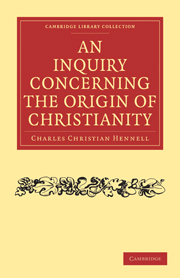Book contents
- Frontmatter
- PREFACE
- Contents
- ERRATA
- CHAPTER I Historical sketch, from the Babylonish captivity to the death of Jesus
- CHAPTER II Historical sketch, continued to the end of the first century
- CHAPTER III On the date and credibility of the Gospel of Matthew
- CHAPTER IV On the date and credibility of the Gospel of Mark
- CHAPTER V On the date and credibility of the Gospel of Luke
- CHAPTER VI On the date and credibility of the Gospel of John
- CHAPTER VII Examination of the accounts of the Resurrection and Ascension
- CHAPTER VIII Remarks on the other miracles in the four Gospels
- CHAPTER IX General objections to the miracles of Jesus
- CHAPTER X Remarks on the miracles in the Acts of the Apostles
- CHAPTER XI On the evidence afforded to the miracles by the apostolic writings
- CHAPTER XII On the prophecies
- CHAPTER XIII On the parts of Isaiah supposed to relate to Christ
- CHAPTER XIV On the book of Daniel
- CHAPTER XV Whether Jesus foretold his own death and resurrection
- CHAPTER XVI On the character, views, and doctrine of Jesus
- CHAPTER XVII Comparison of the precepts of Jesus with the Jewish writings
- CHAPTER XVIII Concluding reflections
- APPENDIX
CHAPTER III - On the date and credibility of the Gospel of Matthew
Published online by Cambridge University Press: 05 March 2012
- Frontmatter
- PREFACE
- Contents
- ERRATA
- CHAPTER I Historical sketch, from the Babylonish captivity to the death of Jesus
- CHAPTER II Historical sketch, continued to the end of the first century
- CHAPTER III On the date and credibility of the Gospel of Matthew
- CHAPTER IV On the date and credibility of the Gospel of Mark
- CHAPTER V On the date and credibility of the Gospel of Luke
- CHAPTER VI On the date and credibility of the Gospel of John
- CHAPTER VII Examination of the accounts of the Resurrection and Ascension
- CHAPTER VIII Remarks on the other miracles in the four Gospels
- CHAPTER IX General objections to the miracles of Jesus
- CHAPTER X Remarks on the miracles in the Acts of the Apostles
- CHAPTER XI On the evidence afforded to the miracles by the apostolic writings
- CHAPTER XII On the prophecies
- CHAPTER XIII On the parts of Isaiah supposed to relate to Christ
- CHAPTER XIV On the book of Daniel
- CHAPTER XV Whether Jesus foretold his own death and resurrection
- CHAPTER XVI On the character, views, and doctrine of Jesus
- CHAPTER XVII Comparison of the precepts of Jesus with the Jewish writings
- CHAPTER XVIII Concluding reflections
- APPENDIX
Summary
The four Gospels contain many things agreeing with the usual order of nature, and necessary to account for the growth of Christianity, such as the existence, public preaching, and death of Christ; but they also contain many things unusual in the order of nature, and, as the preceding sketch has shewn, not necessary to account for the growth of Christianity, such as Christ's miracles and resurrection. Admitting that a miracle may be proved by sufficient testimony, we are forced also to admit that testimony, in order to be sufficient in this case, must be considerably stronger than that upon which we should believe ordinary facts. Paley agrees that Hume states the case of miracles fairly, when he says that it is a question whether it be more improbable that the miracle should be true, or the testimony false. Evid. vol. i. p. 11.
Paley, however, labours to prove that we ought to admit an antecedent probability in favour of a miraculous revelation, from our knowledge of the existence, disposition, and constant agency of the Deity. Others, with Rousseau, have argued that it is antecedently improbable that the Deity should choose to reveal himself by signs of such doubtful and difficult verification as miracles. Most of those who approach the evangelical histories are probably influenced by considerations of one or the other sort; and on the antecedent bias it will depend whether the degree of credibility which can be established for the evangelists appears sufficient to attest even their miraculous narratives. Hence the different conclusions arrived at by those who apply to the study of the Christian evidences.
- Type
- Chapter
- Information
- An Inquiry Concerning the Origin of Christianity , pp. 63 - 82Publisher: Cambridge University PressPrint publication year: 2010First published in: 1838



